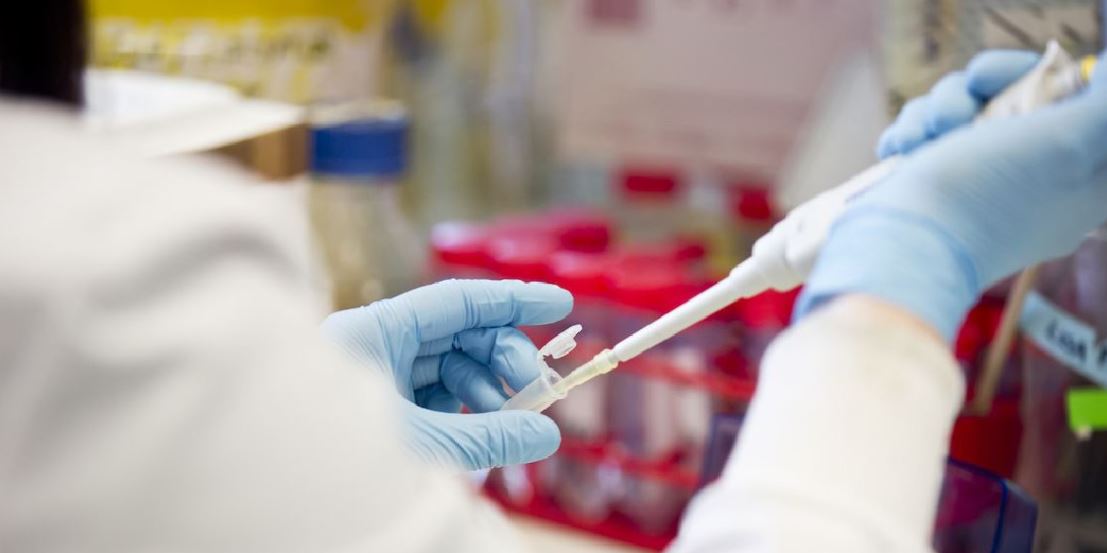WORLD CANCER RESEARCH DAY: HIGHLIGHTING LIFE-CHANGING CANCER RESEARCH AT QUEEN’S

20 September 2021
To mark World Cancer Research Day 2021 on 24th September, we are highlighting the amazing work of cancer researchers at Queen’s University. Want to know more about our priority areas? Find out more below.
Queen’s has a proud history of innovation in medical research and medical education; Queen’s is placed in the UK’s top ten institutions for research intensity (2014 Research Excellence Framework). At the forefront of this is our endeavour to improve patient outcomes and treatment options for cancer patients, in Northern Ireland and beyond.
Professor Mark Lawler, Pro-Vice-Chancellor and Professor of Digital Health said:
“COVID-19 has put enormous pressure on healthcare colleagues, both in Northern Ireland and around the world, and our experts were among the first to highlight the negative impact of COVID-19 on cancer services and cancer patients. Leading the European Time To Act campaign (Mark Lawler - Time To Act) shows the impact that we have made across Europe. It is essential that we continue to care for cancer patients by developing the best treatment options possible, and by finding new and improved ways to detect aggressive forms of cancer at the earliest possible stage.
“Our researchers continue to work throughout the pandemic to carry out vital research across our priority areas. On #WorldCancerResearchDay it is important to highlight the incredible work that has been done so far and to continue to fight for better outcomes for people living with cancer. Such work is only possible with continued support from our donors which we need now, more than ever before.”
PROSTATE CANCER
The clinical prostate research team is led by Professor Joe O'Sullivan along with Professor Suneil Jain, working alongside their NHS colleagues. The team is based at the Northern Ireland Cancer Centre and the Patrick G Johnston Centre for Cancer Research and offer a comprehensive clinical trial portfolio to patients throughout Northern Ireland. As a team, they see more than 500 new prostate cancer patients per year, recruiting an average of 30% to clinical trials.
“We are very proud of our prostate cancer research programme at Queen’s University Belfast and strongly believe that by conducting cutting edge clinical research, we are not only making new scientific discoveries with global impact, but also greatly improving the lives of our patients in Northern Ireland,” said Professor Joe O'Sullivan. Read more about our latest work within this field, including breakthrough research on combined radiotherapies.
GASTRO-INTESTINAL CANCER
Gastro-Intestinal cancer researchers investigate cancers spanning the digestive tract, including:
- Gastro-Intestinal cancer research Upper aero-digestive tumours (head and neck)
- Oesophageal and stomach cancers
- Hepatobiliary tract tumours, including pancreatic cancer
- Small intestine adenocarcinoma
- Colorectal (bowel) cancer
Researchers are drawn from a range of disciplines: scientists, clinicians, epidemiologists, pathologists and bioinformaticians. Our interdisciplinary approach focusses on collaborative research between lab-based and data scientists, and clinical triallists, allowing for close working relationships between our researchers and clinicians.
“The UK and Ireland have the highest rates of oesophageal cancer in the world, and the number of cases in men has risen by 50% in the last 25 years. The rates of pancreatic cancer are also increasing, and we are working on new ways to diagnose and treat these challenging cancers,” said Dr Richard Turkington.
BREAST AND OVARIAN CANCER
Triple Negative Breast Cancers (TNBC) represent the subtype of breast cancer with the poorest clinical outcomes. At present we do not know the molecular drivers of TNBC, therefore, these tumours do not have targeted therapies available and are treated with a generic cocktail of chemotherapy drugs. We are working to identify new biomarkers (tests which indicates a biological response) within current therapies so we can predict which patients will need additional or more intensive treatments. Find out more about our novel targeted therapies.
The most common and aggressive form of ovarian cancer is High Grade Serous Carcinomas (HGSCs). Five year survival rates for HGSCs have remained unchanged (35-40%) for the past three decades. We have identified numerous DNA methylation events occurring early in the pathogenesis of HGSC and are currently developing new early detection approaches to identify these changed with the aim of improving survival outcomes. Find out more.
“To help ensure our research helps women with TNBC in the future, our approach is patient-centric from the start. We use patient samples from women with TNBC where we know whether they responded to current treatments or not and use this to help develop tools to predict response in future cases. For those women who are predicted not to respond, we are using in-depth knowledge of the biology of their tumour to identify alternate therapies (existing or novel drugs) to tailor treatment options making it kinder and more effective,” said Dr Niamh Buckley.
BLOOD CANCER
Our blood cancer research is focused on developing and applying pre-clinical models of the sub-types of these diseases, including myeloid malignancy, multiple Myeloma (MM) and lymphoid malignancies. this is complemented by active collaborations with the haematology consultants across Northern Ireland.
“I hope that Queen’s will continue to lead the way in our understanding of these diseases and continue to work towards identifying novel and repurposed therapies that are more effective and less toxic than many of those used currently for all ages of patients, but particularly for the elderly and the very young patients,” said Professor Ken Mills.
Click here for the latest details of new cancer cases diagnosed in Northern Ireland in 2019, released (16.09.21) by the Queen’s University Northern Ireland Cancer Registry (NICR).
If you’d like to find out more information about a specific area of cancer research, please contact Teresa Sloan at T.Sloan@qub.ac.uk
Back to Main News
Top of Page